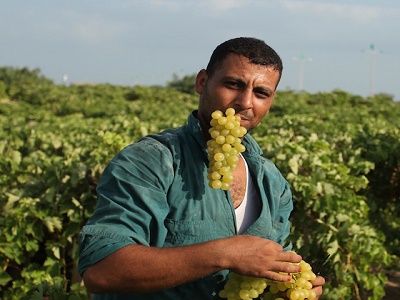
By Sarah Algherbawi
Yasser Shamallakh, 58, stopped growing fruit during the first Intifada, but two years ago he started again and has found success growing the crop, as have many other farmers in Gaza according to official figures.
Although having been under a severe Israeli siege between 2007 and 2014, a combination of good weather and a lifting of Israeli restrictions has helped Palestinian agriculture bloom in recent years.
Shamallakh, whose father was also a farmer, bought land in south Gaza, near Khan Younis. He and other farmers are raising the self-sufficiency of Palestinians in fruit production, a cash crop.
https://twitter.com/KamalShaqi/status/788822069286957056
“The destruction of my land, which was full of fruits, young and old trees, pushed me to stop cultivating my land. But now, I’m going to do it again and I’ll start to re-plant and cultivate all citrus and other types of fruits without fear or hesitation,” he told Mondoweiss.
Many farmers like him were able to take advantage of the 2005 Israeli retreat from Gaza, which saw the withdrawal of settlements and the opening up of fertile land for Palestinian farmers. Agriculture employs about 11 percent of Gazan workers.
According to Fathi Abu Shammallah, head of rural development at the Ministry of Agriculture, Gazan farmers have been able to thrive even amid the siege and bombardment that followed Israel’s retreat.
Fresh-picked strawberries from one of our farming partners in #Gaza – #TastesOf #Palestine #ANERAdinner pic.twitter.com/7DMlFyvQQ2
— ANERA Refugee Aid (@ANERAorg) August 25, 2016
“Last year, the Gaza strip achieved 99% self-sufficiency of vegetables and 70 to 80% of fruits,” for the year 2016, he revealed that the achievements of self-sufficiency are almost the same as the last year in spite of siege, closure, and all types of obstacles.”
In spite of all the challenges, Gazan farmers want to grow more fruit crops. Already 80 thousand acres of fruits and vegetables provide for 80 percent of Gazan consumption and employ 40,000 workers across 20,000 farms. Olives form the majority of fruit cultivation, covering 36,000 acres. Citrus accounts for another 16,000. All told, that’s 13,000 tons of fruits and vegetables set for Europe, the West Bank and Arab countries.
In terms of watermelon, Gaza is doing remarkably well. In two years, Gaza has not had to import the fruit because of self-sufficiency and trade disputes. Gaza cultivated 5 thousand acres of watermelon last season and produced about 30 thousand tons of watermelon.
#Apartheid in the fields: Part 1 #Gaza: farming under siege https://t.co/jBVZqRt9AT #Palestine #israel #BDS
— Michael Lee (@MichaelLee2009) March 29, 2016
The biggest obstacle is the Israeli siege of Gaza, which restricts imports and exports and keeps out medicines for plants. Second to that, there’s the high salt content of the groundwater.
Eng. Tahseen al-Saqqa, marketing manager at the Ministry of Agriculture, stated that crops this year are almost the same like the last year, which showed good earnings, where exports income last year was about 10 million dollars, hoping to have the same size of exports for this year.
Al Saqqa said this is a big turn around after 2014. Between 2007 and that year, there were no fruit exports from Gaza.
“Closure of crossings, especially Karm Abu Salem caused troubles in the trade movements into and out of Gaza Strip. So, exporting from Gaza was unusual and obstructed most of the time, which led to great losses in crops like tomatoes, strawberry, green spices, different fruits, and roses,” Dr. Moein Rajab, a lecturer at al-Azhar University.
The Ministry of Agriculture is now experimenting with growing pineapple. Engineer Mohammed el-Bakry, the director of agriculture labor committees in Gaza, said that a similar experiment in the West Bank succeeded. If it works, pineapples are easy to grow and fetch a good price on the international market.
A young farmer, Fathi al-Kilani, 34, has also started trying to grow strawberries, supported by a Dutch aid group, the Union of Work Committees in Gaza. He got the idea when teaching other Gazan farmers about agriculture.
Al Azhar University economist Moein Rajab said that Israel could not keep down the Palestinian agricultural sector.
“The Israeli fist on cultivation sector of Gaza is very strong and there’s no escape of this fist, except by the well of Gazans and the gift of God in form of suitable soil and weather, which cannot be stopped by Israel.”
- Sarah Algherbawi is a freelancer writer and translator from Gaza. (This article first appeared in Mondoweiss and is published again in the Palestine Chronicle with permission.)





